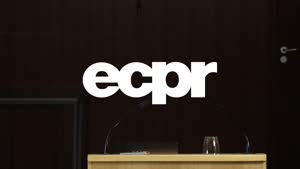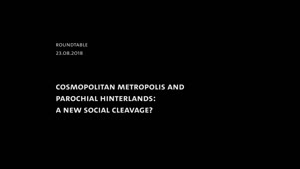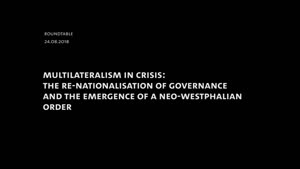Normativity and Reality: Thinking Politically About Politics - Prof. Dr. Rainer Forst - Universität Hamburg
- Lecture2Go
- Videokatalog
- F.2 - Wirtschafts- und Sozialwissenschaften
- Sozialwissenschaften
- ECPR 2018 General Conference
Videokatalog
Normativity and Reality: Thinking Politically About Politics
Plenary Lecture
It goes without saying that a scientific perspective on the social and political world has to be a realistic one. But what really is the reality political science has the task of explaining and understanding? Is it a reality of infinite antagonistic power struggles based on individual and collective interests – and thus any form of normativity supervenient on such interests and struggles? Or is it the other way around: do normative convictions and justifications ground the interests that individuals and collectives pursue? If this latter perspective is correct, power is generated in the discursive space of justifications, and the exercise of power depends on the capacity to rule the normative space of reasons for others. Yet if social and political reality is a reality of justifications, what distinguishes better justifications from worse ones– and what distinguishes different forms of exercising power? I aim to discuss these issues and to suggest some institutional conclusions that follow from these reflections.
Rainer Forst studied with Jürgen Habermas in Frankfurt and with John Rawls at Harvard. Forst received his PhD in Philosophy from Goethe University in 1993 with his Kontexte der Gerechtigkeit (Suhrkamp, 1994; Engl. Contexts of Justice, University of California Press, 2002). Thereafter, he taught at the Free University Berlin, and in 1995/96 and 1999 he was Visiting Professor at the New School for Social Research in New York City. From 1996 to 2002, he taught in Frankfurt and received his 'Habilitation' with Toleranz im Konflikt (Suhrkamp, 2003, Engl. Toleration in Conflict, Cambridge University Press 2013). In 2003, he received a Heisenberg Fellowship from the German Research Foundation. In 2005/06 he was the Theodor Heuss-Professor at the New School and since 2004 has been Professor of Political Theory and Philosophy in Frankfurt.
Since 2007, he has been co-director of the Research Cluster 'The Formation of Normative Orders,' a major interdisciplinary research centre funded by the German Excellence Initiative. He has also been a member of the founding directorate of the new Institute for Advanced Studies of Goethe-University at Bad Homburg near Frankfurt (where he is a Permanent Fellow) and is Director of the Research Center Justitia Amplificata based in Frankfurt. He is also Research Professor at the Berlin Social Science Center.
Rainer Forst's Das Recht auf Rechtfertigung (Suhrkamp) appeared in 2007, published in 2012 as The Right to Justification (Columbia University Press). In 2009, he was Harris Distinguished Visiting Professor at Dartmouth College. In 2011, Kritik der Rechtfertigungsverhältnisse (Suhrkamp) appeared (Engl. 2013 from Polity Press as Justification and Critique). In 2013, he was a Noël Fellow at New York University. His Normativität und Macht (Suhrkamp 2015) just came out with Oxford University Press as Normativity and Power. Rainer Forst serves as Associate Editor of Ethics, is part of the Executive Editorial Committee of Political Theory and is on the board of numerous international journals such as European Journal of Political Theory and Contemporary Political Theory. In addition, he co-edits the series Theorie und Gesellschaft and Normative Orders (both with Campus Verlag). In 2012, he received the Gottfried Wilhelm Leibniz Prize of the German Research Foundation, the highest honour awarded to German researchers. He is a Member of the Berlin Brandenburg Academy of Sciences and Humanities.
Video production: eLearning-support at the faculty of business, economics and social sciences



